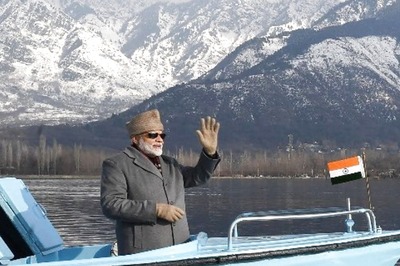
views
India’s neighbours face tough economic times. We have a floundering Pakistan on one side, a Sri Lanka trying to rebuild on another side, and a loan-seeking Bangladesh on the third side. Only 18 months earlier, those considered economics experts cited disparate metrics to claim that they were each doing exponentially better than India on the economic front. Yet, it is India that is helping the two non-hostile neighbours better their economic conditions. On the other hand, the other major democracy that the world looks to for support in trying times has surprised many. US Secretary of State, Antony Blinken, threatened Bangladesh with visa restrictions on officials.
Interestingly, a spate of articles in internationally read publications out of the US, written around the time cite disconnected incidents as reflective of “democratic backsliding” in yet another country. It’s more astounding considering that the alternative to Sheikh Hasina is former Bangladeshi Prime Minister Khaleda Zia who made no bones about embracing Islamic fundamentalism in her governance. If one Pakistan is difficult to handle for India, one can only imagine what two belligerent Islamic nations on different sides of the country could mean for its border security.
This is not to say that the Sheikh Hasina government does not use and value radicalism when it suits the maintenance of power. Hasina’s government has overseen rampant and ongoing destruction of Hindu temples, rapes and murders of Hindu women, and killing of atheist and homosexual personalities, and yet keeps fundamentalism at bay when it comes to external relations. She finds a staunch friend in India and has recently sent 600 kgs of mangoes to Mamata Banerjee, the Chief Minister of West Bengal, in a show of diplomacy. She has found India supportive of her governance, and both partners have pledged to support the other’s claim to a non-permanent seat at the United Nations Security Council. There is also increased cooperation to increase connectivity between the neighbours to help with goods transport and trade.
Blinken’s statement comes at a time when inflation is high and Bangladeshi Opposition parties are fanning protests against the sitting prime minister. Despite extreme scepticism at the way election results were contested and declared in the US, democracies across the world accepted the declaration as a matter of citizen interest only. The threat to the Bangladeshi system is real enough that the Hasina government sought to respond and reiterate that free and fair elections will be held on schedule in January 2024. In times when the nation is in need of aid and support, there is a sense of bullying from the US government. As always, the Indian government extended its support to the Bangladesh government, conveying “warm wishes” from Indian Prime Minister Narendra Modi. However, there is little an outside country, that is not the US, can do if attempts are made to destabilise a sitting government. As with colour revolutions across the world in recent times, neighbours have stood by to watch the fallout and scramble to best accommodate their own citizens. It has not gone unnoticed by the threatened nations – Bangladesh PM Hasina has called the US out about their attempts at regime change in the country.
While there may be verbal signals to autocracies around the world, the Biden administration and its officials have chosen to attack established democracies through action. Coercive statements similar to the one made by Antony Blinken in the context of Bangladesh have also been applied to India. Commentaries from officials as well as major pro-establishment publications in the US tend to conveniently decry the democracy of other nations as they head towards national elections. Still, in a letter showing spine from MA Arafat, a Bangladeshi academic and a political intellectual of the ruling Awami League, a video showcasing radical elements of the Bangladeshi Opposition was shared as evidence of misdirected ire. Arafat hoped the US Secretary of State would also consider these people promising to obstruct fair elections when the visa restrictions by the US were implemented. However, the American establishment chose not to respond.
Interestingly, with the US comfortable with fraying ties in India’s neighbourhood only leaves more space for a further increase of Chinese influence in the region. China is now Bangladesh’s top trading partner, importer and military supplier. Their textile industry finds purchase in the world’s leading manufacturing nation. China continues to invest heavily in Sri Lanka, despite being left out of loan restructuring talks lately. Chinese money comes with strings attached, and the US seems willing to push nations towards Chinese autocracy with its belligerence. Bangladesh has also requested China for help with the repatriation of a large Rohingya population.
Democracy cannot be a mere excuse to seek pliant governments by the US, and yet its wars in Iraq and Afghanistan that have left citizenry desperate and destitute and neighbourhoods in disarray, show that the country is willing to go the distance and use military options. While Bangladesh threat assessments cannot be based on mere words by Blinken, the record with regards to US interest in creating puppet governments only to withdraw when it is suitable for themselves would certainly make any democracy wary.
An observer of American geopolitical relationships might think that human rights are called on to only substantiate self-serving strategic goals for the US, in place of genuine concern about them. The country has continued to turn a blind eye with regards to flagrant violations of human rights in Pakistan, Qatar and other Islamic theocracies. At the same time, it has found it suitable to build narratives around unconnected incidents to tie them to government high-handedness when it comes to democracies such as Bangladesh and India. Perhaps, the cries grow shriller and the attempts to play favourites with Opposition parties in the nations continue to increase until both neighbours have elections next year. It is an unfortunate state of affairs where a major world democracy cannot be counted upon to allow sovereign democracies safe elections. As a major power and continued global pole of influence, all democracies can only hope that US meddling in elections is restricted to statements, while knowing that such hopes may well be dashed.
Sagorika Sinha is a columnist and podcaster with Masters in Biotechnology from the University of Bath. Views expressed are personal.




















Comments
0 comment